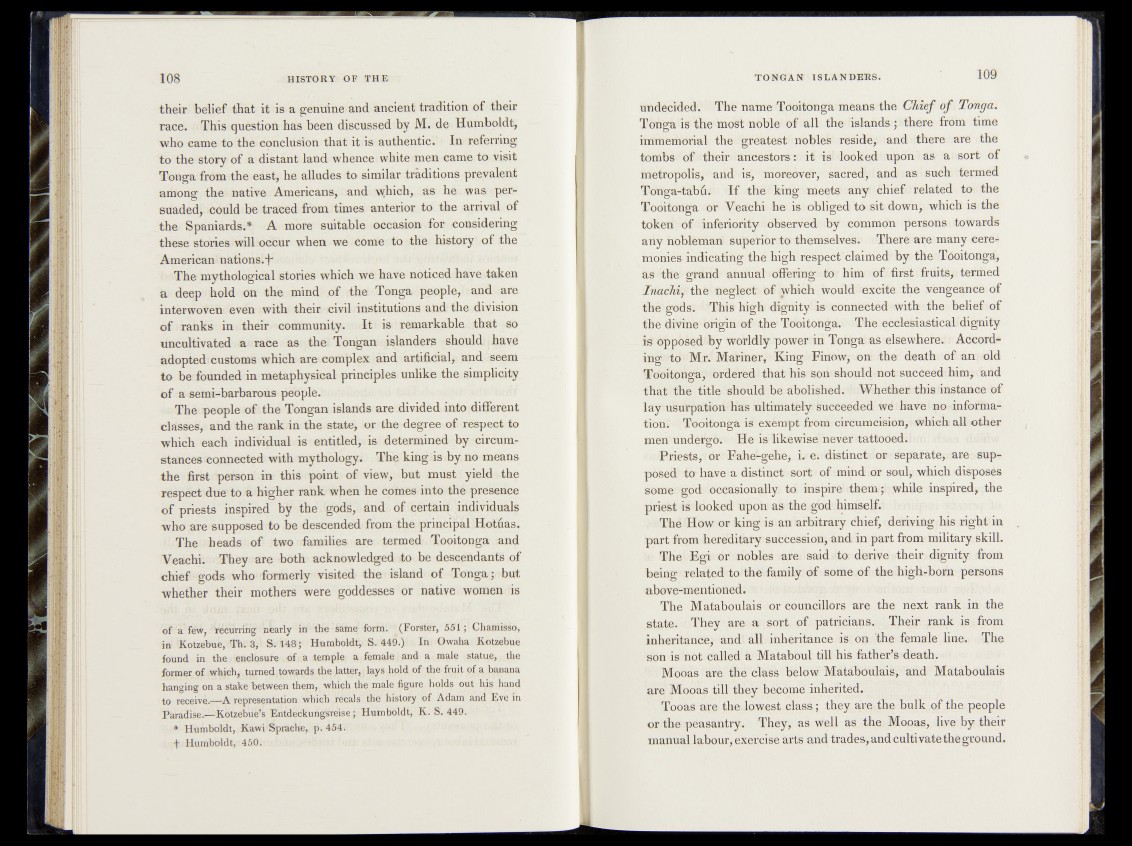
their belief that it is a genuine and ancient tradition of their
race. This question has been discussed by M. de Humboldt,
who came to the conclusion that it is authentic. In referring
lo the story of a distant land whence white men cam® to visit
Tonga from the east, he alludes to similar traditions prevalent
among the native Americans, and vjhich, as he was persuaded,
could be traced from times anterior to the arrival of
the Spaniards.* A more suitable occasion for considering
these stories will occur when we come to the history of the
Americannations. f
The mythological stories which we have noticed have taken
a deep hold on the mind of the Tonga people, and are
interwoven even with their civil institutions and the division
of ranks in their community. It is remarkable that so
uncultivated a race as the Tongan islanders should , have
adopted customs which are complex and artificial, .and seem
to be founded in metaphysical principles unlike the simplicity
of a semi-barbarous people.
The people of the Tongan islands are divided into different
classes, and the rank in the state, or the degree of respect to
which each individual is entitled, is determined by circumstances
connected with mythology. The king is by no means
the first person in this point of view, but must yield: the
respeet due to a higher rank when he comes into the presence
of priests inspired by the gods, and of certain individuals
who are supposed to be descended from the principal Hotfias.
The heads of two families are termed Tooitonga ;and
Veachi. They are both acknowledged to be descendants of
chief gods who formerly visited the island of Tonga; but
whether their mothers were goddesses or native women is
of afew, ^Vecurritig-- nfearly in the same form; - (Forster, 551; Chattiisso,
in Kotzebue, Th; 3,- S* 148; Humboldt, S. 449.)- In Owaha Kotzebue
found in the enclosure of a temple a female and a male statue, the
former of .which, t^ed,toiw^ds. the fatter,; lays hold of the fruit of a banana
hanging on a stake between them, which the male figure holds out his hand
to receive.-:—A representation which recals the history of Adam and Eve in
Faradi^.—Ilotzebtih’s Entdeckungsreise; Humboldt, K. S. 449.
* Humboldt, Kawi Spraehe, p. 454.
f Humboldt, 45,0.
undecided'. The name Tooitonga means the Chief of Tonga.
Thnga'i^ the^mbët noble of all the islands; there from time
immemorial the greatest nobles reside, and there are the
tombs of their ! ancestors É it ris’ looked upon as a I sort of
metropolis, and is, moreover, sacred:, and as such termed
Tonga-tÓbé.' If the king meets' any chief related to the
Tooitonga or Veachi he is obliged to sit down,: which is the
token of inferiority I observed by common persons| towards
arty nobleman superior to themselves. There are many ceremonies
indicating the high respect'claiméd by the. Tooitonga,
as the grand animal-offering1 to him of first fruits, termed
JnacM, the neglect of jvhich would'excite the vengeance of
the gods. This high dignityuis connected with the belief of
the divine origin <rf the Tooitonga*; .Theieöelefeiasticalsdignity
Is' opposed by worldly power in Tonga’as elsewhere* According
rid • Mr. Mariner, King Firtow, on the death óf; an old
Tooitottga;! ordered that his son should not;succeed him, and
that the title should be abolished. Whether this instance of
lay msul’patiori > has ultimately succeeded wé have nodtnforina-
tibih Töditóngtóö exempt from circumcfeioia^jvvMch! allother
men undergo. He is likewise never tattooed.hö
a Friests, ör ’ Eahef-geife, i. ei-diistinctitoR^pgaiateij; are su p
posed to: have a distinct sort of isamd -Or soul, which disposés
some-;god occasionally to inspire them:;; while inspired, the
priest is looked upon as the god himself.;
Thé How or king is an arbitraiy chief, deriving his right in
part from hereditary succession, and in part from military skill.
: The Egi or nobles are. said to derive ribeir.dignity from
being related to the family of some of the high-born persons
above-mentioned.
The Mataboulais or councillors are the next rank in the
state. They are a sort of patricians, Their rank is . from
inheritance* and all inheritance is on "the female line. The
son is ;not called a Mataboui till his father’s death. é *
Mooas are the class below Mataboulais, and Mataboulais
are Mooas till they become inherited.
Tooas are the lowest class; .they ar%.the bulk, of the people
or the peasantry. They, as well as the Mooas, live by their
manual labour, exercise arts and trades, and cultivate the ground.